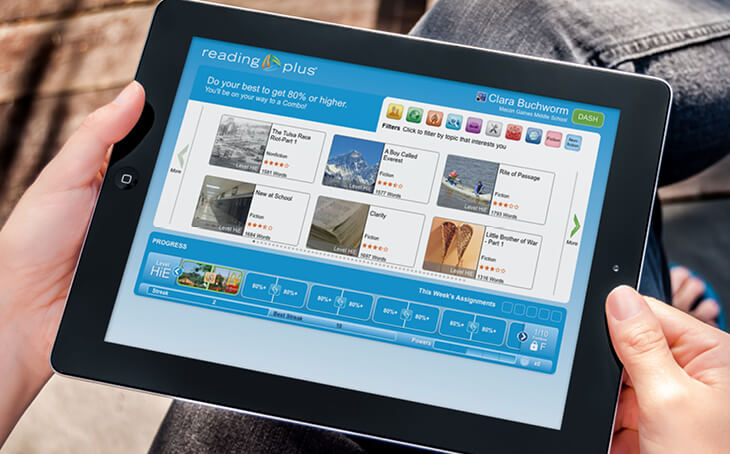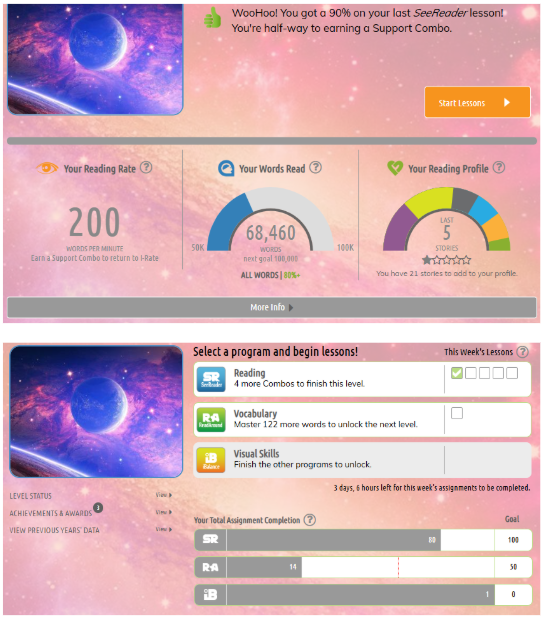Reading Plus
 Reading Plus is an adaptive literacy solution that improves fluency, comprehension, vocabulary, stamina, and motivation. Used in more than 7,800 schools, Reading Plus is helping more than one million students become proficient readers.
Reading Plus is an adaptive literacy solution that improves fluency, comprehension, vocabulary, stamina, and motivation. Used in more than 7,800 schools, Reading Plus is helping more than one million students become proficient readers.
- Adaptive: Students’ initial reading level and speed are calculated by an Insight Assessment before lessons, and their progress through reading libraries depends on their success in answering a range of reading questions accurately.
- Literacy: Reading plus includes a wide range of texts from pre-primary to University undergraduate level about a wide range of topics, in both fiction and non-fiction forms. There is also the capacity to use students’ lessons to develop personalised intervention tasks and set writing tasks.
- Fluency: Reading quickly and accurately
- Comprehension: Understanding texts on different levels
- Vocabulary: New and more advanced words
- Stamina: Resilience and concentration over increasing times
- Motivation: Providing a variety of texts to make students want to read more, both within the programme and more widely
- Proficient: Students need to access texts with a reading of age of 16 or above during their exams, and throughout the rest of their lives.
What are the benefits of Reading Plus for students?
- Increased reading FLUENCY and SPEED
- Increase in KNOWLEDGE and CULTURAL CAPITAL
- Increased READING LEVEL
- Understanding of a wider VOCABULARY
- Developed READING SKILLS
- Instant FEEDBACK
- Improved CONCENTRATION and RESILIENCE
- AWARDS and REWARDS
- Developing INDEPENDENCE, ORGANISATION and individual STUDY SKILLS
What are the school’s expectations for Reading Plus?
The standard number of weekly tasks that students are expected to complete are:
- 5 reading lessons, where they select texts that interest them before answering 10 comprehension questions which test a range of reading skills.
- 1 vocabulary lesson.
Students have one PD session per fortnight, and half of their LRC lesson once a fortnight, with the remainder being set for their English home learning.
Students are rewarded with an H+ for completing their tasks.
It is important that students give reading lessons and the quiz that follows their full attention, as students need to gain 80%+ in the quizzes to pass them, and make progress towards the next library.
Passing two consecutive quizzes gains a ‘combo’; gaining between three and five combos unlocks the next year level library in Reading Plus. Students are awarded with a certificate when they move up a level.
To ensure that students complete work and in order to instill good study habits and responsibility for their own learning, students not completing or passing enough of their lessons each week attend a session in the LRC on Wednesdays or Thursdays where they can work with supervision on the current week’s lessons and receive help and support if necessary.
What do G-Rate and I-Rate mean in SeeReader?
The G-Rate is the rate at which the Guided Window moves across the text as you read your stories. The independent rate, or I-Rate, is your rate when you read without the Guided Window. Your I-Rate is on target if it’s about the same as your G-Rate. Try to keep your I-Rate and G-Rate about the same.
How can we ensure that students succeed with Reading Plus?
- Students should use reminders on Arbor and in their planners to remember to complete work
- Students should do no more that 2 lessons during a sitting to avoid rushing or losing concentration and do not leave more than 2 lessons until deadline day (Sunday)
- The programme gives constant warnings if students are reading too quickly or slowly, or answering questions quickly and inaccurately.
- If students continue to ignore these warnings, they will be put on hold by the programme and will be unable to continue
- Teachers regularly unlock students who are on hold, but students can email their class teacher to try to get this done more quickly
- Students have the opportunity to use re-reads - reading sections of texts again to improve their chances of finding the right answer. They should use this function rather than guessing whenever they are unsure of an answer.
- Students who continually answer questions with low accuracy will be placed in support mode which will give additional help such as re-reads to slow the student down to hopefully improve the quality of their reading and comprehension.
- If your son or daughter is continually struggling with Reading Plus, or is unable to complete work in a given week, contact their class teacher ideally by the end of Sunday. We can make a range of adjustments and allowances, and offer a range of support to students who are experiencing temporary or longer term difficulties.
Accessing Reading Plus
 Go to login.readingplus.com and select ‘I’m a student’
Go to login.readingplus.com and select ‘I’m a student’- Enter the site code: rpselbyhig
- Enter the username and password on the sticker inside the cover of student’s planner.
In most cases this will be their first name and first initial of their surname, e.g benp, unless there are duplicates of the same name in the school. The password is ‘qwerty’ unless students have changed their passwords - Select start lessons from the dashboard screen (which also shows key statistics about student’s progress so far)
- Students lessons are shown as blank boxes. Tick on these to start a reading or writing lesson.
- Once lessons are completed, ticks will appear with a background coloured green (for quizzes passed at 80% plus) yellow (near miss 70-79%) or orange (below 70%)
How do we use information from Reading Plus?
- The reading age levels generated by the Insight assessments at the start of the year are used, alongside other information such as KS2 reading test scores, paper reading tests and teacher’s knowledge of students, to determine which students may need to receive additional intervention lessons or support. It is therefore essential that students try their hardest and take their time on this assessment.
- Students who are completing lessons, but not passing quizzes regularly are monitored by class teachers and the literacy team, who may offer additional support during p6 sessions on Monday, Wednesday and Friday.
















